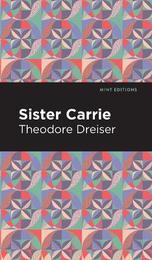
|
Sister Carrie
Hardback
Main Details
| Title |
Sister Carrie
|
| Authors and Contributors |
By (author) Theodore Dreiser
|
|
Contributions by Mint Editions
|
| Series | Mint Editions |
|---|
| Physical Properties |
| Format:Hardback | | Pages:414 | | Dimensions(mm): Height 203,Width 127 |
|
| Category/Genre | Classic fiction (pre c 1945) |
|---|
| ISBN/Barcode |
9781513135397
|
| Classifications | Dewey:813.52 |
|---|
| Audience | |
|---|
|
Publishing Details |
| Publisher |
West Margin Press
|
| Imprint |
West Margin Press
|
| Publication Date |
15 February 2022 |
| Publication Country |
United States
|
Description
Sister Carrie (1900) is a novel by Theodore Dreiser. Controversial for its honest depiction of work, desire, and urban life, Sister Carrie has endured as a classic of naturalist fiction and remains a powerful example of social critique over a century after its publication. Despite poor reviews upon publication, the novel is now considered a landmark of American literature. Tired of the countryside, Carrie Meeber moves to Chicago to live with her older sister and her husband. On the train ride into the city, she meets an older man, a handsome traveling salesman named Charles Drouet. Despite their obvious attraction, she decides to focus on finding work in order to pay rent. Carrie struggles at a local factory and longs to pursue her interest in acting, but knows that her obligation to family requires she work diligently and without complaint. One day, she encounters Charles on the street and joins him for lunch. He offers to take her in, suggesting that she need no longer worry about factory work or her sister, and remarking on her natural beauty and effortless charm. Soon, however, she strikes up a relationship with an unhappily married man, risking her stability with Charles and tying her fortunes to Hurstwood, who soon proves arrogant and manipulative. With a beautifully designed cover and professionally typeset manuscript, this edition of Theodore Dreiser's Sister Carrie is a classic of American literature reimagined for modern readers.
Author Biography
Theodore Dreiser (1871-1945) was an American novelist and journalist. Born in Indiana, Dreiser was the son of John Paul Dreiser, a German immigrant, and Sarah Maria Schanab, a Mennonite from Ohio who converted to Catholicism and was banished by her community. Raised in a family of thirteen children, of which he was the twelfth, Dreiser attended Indiana University for a year before taking a job as a journalist for the Chicago Globe. While working for the St. Louis Globe-Democrat, Dreiser wrote articles on Nathaniel Hawthorne and William Dean Howells, as well as interviewed such figures as Andrew Carnegie and Thomas Edison. In 1900, he published his debut novel Sister Carrie, a naturalist portrait of a young midwestern woman who travels to Chicago to become an actress. Despite poor reviews, he continued writing fiction, but failed to find real success until An American Tragedy (1925), a novel based on the 1906 murder of Grace Brown. Considered a masterpiece of American fiction, the novel grew his reputation immensely, leading to his nomination for the 1930 Nobel Prize in Literature, which ultimately went to fellow American Sinclair Lewis. Committed to socialism and atheism throughout his life, Dreiser was a member of the Communist Party of the United States of America and a lifelong champion of the working class.
|